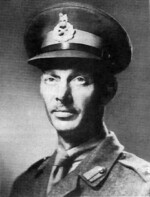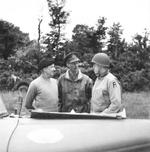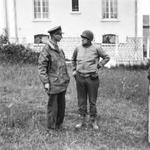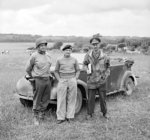Miles Dempsey
| Surname | Dempsey |
| Given Name | Miles |
| Born | 15 Dec 1896 |
| Died | 5 Jun 1969 |
| Country | United Kingdom |
| Category | Military-Ground |
| Gender | Male |
Contributor: C. Peter Chen
ww2dbaseMiles Dempsey was born in New Brighton, Cheshire, England in the United Kingdom. His lineage traced back to the aristocratic O'Dempsey family of Clanmalier. He was educated at Shrewsbury School and the Royal Military College, Sandhurst. Upon graduating in 1915, he joined the Royal Berkshire Regiment and fought in WW1 on the Western Front. During the inter-war years, he reached the position of lieutenant colonel after experience leading men of the 5th Infantry Brigade, the 1st Battalion of the Royal Berkshire Regiment, and others. As the commanding officer of the British 13th Infantry Brigade of the British Expeditionary Force between 20 Nov 1939 and 18 Jul 1940, he took part in the massive evacuation at Dunkirk, France during the German invasion of France. His unit was the rear guard for the retreating forces; such bravery during the evacuation, he was awarded the Distinguished Service Order. Between 1941 and end of 1942, he led the 46th and later the 42nd Infantry Divisions; the latter was renamed the 42nd Armored Division on 1 Nov 1942. In Dec 1942, he was promoted to the rank of lieutenant general and was given command of the 13th Corps in the British 8th Army in North Africa. In 1943, with the 13th Corps, he participated in the invasion of Sicily, followed by the Italian campaign, where he remained until Jan 1944. On 26 Jan 1944, he became the commanding officer of the British 2nd Army, which took part in Gold, Juno, and Sword beaches during the Normandy invasion in Jun 1944. By Sep 1944, his troops were in the Low Countries, and crossed the Rhine River into Germany on 23 Mar 1945. In May, men of the 2nd Army captured Bremen, Hamburg, and Kiel in Germany. On 5 Jul 1945, he was made Knight Commander of the Order of the British Empire. On 9 Aug 1945, he was named the commanding officer of the 14th Army. Between late 1945 and 1947, he was the Allied Commander in Chief of Land Forces in Southeast Asia, and then the British Commander in Chief in the Middle East. He retired from active service in 1947, but held several honorary posts after retirement. On 2 Jan 1956, he was made a Knight Grand Cross of the Order of the British Empire. He passed away in Yattendon, Berkshire, England.
ww2dbaseSource: Wikipedia.
Last Major Revision: Dec 2007
Miles Dempsey Interactive Map
Photographs
 |  |  |  |
Miles Dempsey Timeline
| 15 Dec 1896 | Miles Dempsey was born. |
| 5 Jun 1969 | Miles Dempsey passed away. |
Did you enjoy this article or find this article helpful? If so, please consider supporting us on Patreon. Even $1 per month will go a long way! Thank you. Share this article with your friends: Stay updated with WW2DB: |
Visitor Submitted Comments
All visitor submitted comments are opinions of those making the submissions and do not reflect views of WW2DB.
» Invasion of France and the Low Countries
» Invasion of Sicily and Italy's Surrender
» Normandy Campaign, Phase 1
» Liberation of Belgium
» Crossing the Rhine
- » 1,150 biographies
- » 337 events
- » 44,024 timeline entries
- » 1,241 ships
- » 350 aircraft models
- » 207 vehicle models
- » 375 weapon models
- » 123 historical documents
- » 260 facilities
- » 470 book reviews
- » 28,578 photos
- » 432 maps
Winston Churchill
Please consider supporting us on Patreon. Even $1 a month will go a long way. Thank you!
Or, please support us by purchasing some WW2DB merchandise at TeeSpring, Thank you!
12 Dec 2007 08:11:50 AM
The Commander of the British 2nd Army in North West Europe 1944-45 was a much tougher character than one would at first assume.
On one occasion he arrived at the Command Post of Lt. General Brian Horrocks XXX Corps in Belgium to issue the Corps Commander with new orders. Calm and collected as usual, General Dempsey sat in General Horrocks caravan clarifying his orders in his usual fashion, and then personnally confirmed them in writing before making his departure.
It was only later that General Horrocks learnt that the small Auster aircraft in which the Second Army Commander had arrived, had crashed and overturned on landing. Although he must have been badly shaken by this event, he had not even thought of mentioning it during the briefing.